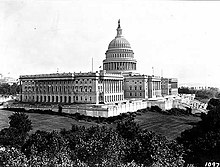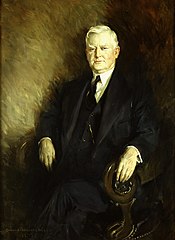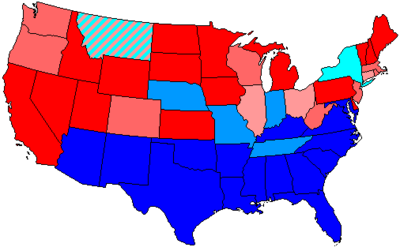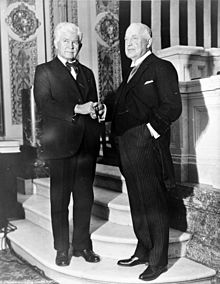72nd United States Congress
| 72nd United States Congress | |
|---|---|
71st ← → 73rd | |
 United States Capitol (1906) | |
March 4, 1931 – March 4, 1933 | |
| Members | 96 senators 435 representatives 5 non-voting delegates |
| Senate majority | Republican (with tie-breaking VP) |
| Senate President | Charles Curtis (R) |
| House majority | Republican, then Democratic |
| House Speaker | John N. Garner (D) |
| Sessions | |
| 1st: December 7, 1931 – July 16, 1932 2nd: December 2, 1932 – March 3, 1933 | |
The 72nd United States Congress was a meeting of the legislative branch of the United States federal government, consisting of the United States Senate and the United States House of Representatives.[1][2] It met in Washington, D.C. from March 4, 1931, to March 4, 1933, during the last two years of Herbert Hoover's presidency. The apportionment of seats in this House of Representatives was based on the 1910 United States census. The Senate had a Republican majority. The House started with a very slim Republican majority, but by the time it first met in December 1931, the Democrats had gained a majority through special elections.
Major events
- Ongoing: Great Depression
- January 12, 1932: Hattie Wyatt Caraway of Arkansas became the first woman elected to the United States Senate. (Rebecca Latimer Felton of Georgia had been appointed to fill a vacancy in 1922; the 87-year-old Felton served one day as a senator.) Caraway had won a special election to fill the remaining months of the term of her late husband, Senator Thaddeus Caraway. She won re-election to a full term in 1932 and again in 1938 and served in the Senate until January 1945.[3]
- July 28, 1932: Bonus Army was dispersed.
- November 8, 1932: 1932 United States elections:
- 1932 United States presidential election: Incumbent Republicans Herbert Hoover and Charles Curtis lost to Democrats Franklin Roosevelt as President, and John Nance Garner as Vice President.
- 1932 United States Senate elections: Democrats gained 12 seats for a 59–36 majority.
- 1932 United States House of Representatives elections: Democrats gained 97 seats for a 313–117 majority.
Major legislation
- January 22, 1932: Reconstruction Finance Corporation Act, Sess. 1, ch. 8, 47 Stat. 5
- February 27, 1932: Glass-Steagall Act of 1932, Sess. 1, ch. 58, 47 Stat. 56
- March 23, 1932: Norris-LaGuardia Act, Sess. 1, ch. 90, 47 Stat. 70
- June 6, 1932: Revenue Act of 1932, Sess. 1, ch. 209, 47 Stat. 169
- June 22, 1932: Federal Kidnapping Act, Sess. 1, ch. 271, 47 Stat. 326
- June 30, 1932: Economy Act of 1932, Sess. 1, ch. 314, 47 Stat. 399
- July 21, 1932: Emergency Relief and Construction Act, Sess. 1, ch. 520, 47 Stat. 709
- July 22, 1932: Federal Home Loan Bank Act, Sess. 1, ch. 522, 47 Stat. 725
- January 17, 1933: Hare-Hawes-Cutting Act, Sess. 2, ch. 11, 47 Stat. 761
- March 3, 1933: Buy American Act, Sess. 2, ch. 212, title III, 47 Stat. 1520
Constitutional amendments
- March 2, 1932: Approved an amendment to the United States Constitution moving the beginning and ending of the terms of the president and vice president from March 4 to January 20, and of members of Congress from March 4 to January 3, and also establishing what is to be done when there is no president-elect, and submitted it to the state legislatures for ratification
- January 23, 1933: The Twentieth Amendment to the United States Constitution was ratified by the requisite number of states (then 36) to become part of the Constitution.
- February 20, 1933: Approved an amendment to the U.S. Constitution repealing the Eighteenth Amendment, and submitted it to state ratifying conventions for ratification
- Amendment was later ratified on December 5, 1933, becoming the Twenty-first Amendment to the United States Constitution
Party summary
The count below identifies party affiliations at the beginning of the first session of this Congress, and includes members from vacancies and newly admitted states, when they were first seated. Changes resulting from subsequent replacements are shown below in the "Changes in membership" section.
Senate
Republicans controlled the Senate through a VP-tie-breaking majority.
| Party (shading shows control) |
Total | Vacant | |||
|---|---|---|---|---|---|
| Democratic (D) |
Farmer– Labor (FL) | Republican (R) |
|||
| End of previous congress | 42 | 1 | 53 | 96 | 0 |
| Begin | 47 | 1 | 48 | 96 | 0 |
| End | 46 | 95 | 1 | ||
| Final voting share | 48.4% | 1.1% | 50.5% | ||
| Beginning of next congress | 58 | 1 | 36 | 95 | 1 |
House of Representatives
| Affiliation | Party (Shading indicates majority caucus) |
Total | |||
|---|---|---|---|---|---|
| Democratic | Farmer–Labor | Republican | Vacant | ||
| End of previous Congress | 166 | 1 | 265 | 432 | 3 |
| Begin | 216 | 1 | 217 | 434 | 1 |
| March 16, 1931 | 215 | 433 | 2 | ||
| April 9, 1931 | 216 | 432 | 3 | ||
| May 12, 1931 | 216 | 216 | 433 | 2 | |
| May 26, 1931 | 215 | 216 | 432 | 3 | |
| May 29, 1931 | 214 | 431 | 4 | ||
| July 4, 1931 | 215 | 430 | 5 | ||
| July 13, 1931 | 213 | 429 | 6 | ||
| July 18, 1931 | 214 | 428 | 7 | ||
| July 28, 1931 | 212 | 427 | 8 | ||
| September 9, 1931 | 213 | 428 | 7 | ||
| September 29, 1931 | 214 | 214 | 429 | 6 | |
| October 13, 1931 | 215 | 430 | 5 | ||
| October 18, 1931 | 214 | 429 | 6 | ||
| October 22, 1931 | 214 | 213 | 428 | 7 | |
| November 3, 1931 | 217 | 215 | 433 | 2 | |
| November 6, 1931 | 214 | 432 | 3 | ||
| November 24, 1931 | 218 | 433 | 2 | ||
| December 1, 1931 Beginning of first session |
219 | 1 | 214 | 434 | 1 |
| January 5, 1932 | 220 | 435 | 0 | ||
| January 29, 1932 | 213 | 434 | 1 | ||
| February 4, 1932 | 218 | 432 | 3 | ||
| March 2, 1932 | 219 | 433 | 2 | ||
| March 15, 1932 | 220 | 434 | 1 | ||
| April 1, 1932 | 212 | 433 | 2 | ||
| April 5, 1932 | 221 | 211 | |||
| April 21, 1932 | 210 | 432 | 3 | ||
| April 26, 1932 | 211 | 433 | 2 | ||
| May 31, 1932 | 210 | 432 | 3 | ||
| June 14, 1932 | 220 | 431 | 4 | ||
| July 23, 1932 | 219 | 430 | 5 | ||
| August 14, 1932 | 220 | 431 | 4 | ||
| October 5, 1932 | 219 | 430 | 5 | ||
| October 7, 1932 | 218 | 429 | 6 | ||
| November 6, 1932 | 217 | 428 | 7 | ||
| November 8, 1932 | 220 | 212 | 433 | 2 | |
| November 29, 1932 | 211 | 432 | 3 | ||
| December 3, 1932 | 210 | 431 | 4 | ||
| December 13, 1932 | 219 | 430 | 5 | ||
| January 7, 1933 | 209 | 429 | 6 | ||
| January 8, 1933 | 208 | 428 | 7 | ||
| January 28, 1933 | 220 | 429 | 6 | ||
| February 16, 1933 | 206 | 427 | 8 | ||
| Final voting share | 51.4% | 0.2% | 48.4% | ||
| Non-voting members | 0 | 0 | 2 | 5 | 0 |
| Beginning of next Congress | 311 | 5 | 117 | 433 | 2 |
Leadership

Charles Curtis (R)
Senate
Majority (Republican)
- Majority Leader: James E. Watson
- Majority Whip: Simeon D. Fess
- Republican Conference Secretary: Frederick Hale
- National Senatorial Committee Chair: Daniel O. Hastings
Minority (Democratic)
- Minority Leader: Joseph T. Robinson
- Minority Whip: Morris Sheppard
- Democratic Caucus Secretary: Hugo Black
House of Representatives

- Speaker: John N. Garner (D)
Note: Republican Nicholas Longworth, the Speaker of the House in the previous Congress, was Speaker-presumptive with his party's mere three-seat majority. However, Longworth died on April 9, 1931, and by the time the 72nd Congress convened in December 1931, Democrats had gained four seats from Republicans through special elections following deaths, thus becoming the majority party in the House. Democrat John Garner was subsequently elected as Speaker.[4]
Majority (Democratic)
- Majority Leader: Henry T. Rainey
- Majority Whip: John McDuffie
- Democratic Caucus Chairman: William W. Arnold
- Democratic Campaign Committee Chairman: Joseph W. Byrns Sr.
Minority (Republican)
- Minority Leader: Bertrand H. Snell
- Minority Whip: Carl G. Bachmann
- Republican Conference Chairman: Willis C. Hawley
- Republican Campaign Committee Chairman: William R. Wood
Members
This list is arranged by chamber, then by state. Senators are listed by class, and representatives are listed by district.
Senate
Senators were elected every two years, with one-third beginning new six-year terms with each Congress. Preceding the names in the list below are Senate class numbers, which indicate the cycle of their election. In this Congress, Class 1 meant their term began in the last Congress, requiring reelection in 1934; Class 2 meant their term began with this Congress, requiring reelection in 1936; and Class 3 meant their term ended with this Congress, requiring reelection in 1932.
House of Representatives
The names of members of the House of Representatives elected statewide on the general ticket or otherwise at-large, are preceded by an "At-large," and the names of those elected from districts, whether plural or single member, are preceded by their district numbers.
Changes in membership
Senate
- Replacements: 11
- Democratic: 1-seat net loss
- Republican: no net change
- Deaths: 6
- Resignations: 1
- Interim appointments: 5
- Total seats with changes: 8
| State (class) |
Vacated by | Reason for change | Successor | Date of successor's formal installation[b] |
|---|---|---|---|---|
| Vermont (1) |
Frank C. Partridge (R) | Interim appointee lost nomination to finish the term. Successor elected March 31, 1931. |
Warren Austin (R) | April 1, 1931 |
| New Jersey (2) |
Dwight Morrow (R) | Died October 5, 1931. Successor was appointed and later elected. |
William W. Barbour (R) | December 1, 1931 |
| Arkansas (3) |
Thaddeus H. Caraway (D) | Died November 6, 1931. Successor was appointed to finish the term. |
Hattie Caraway (D) | November 13, 1931 |
| Georgia (2) |
William J. Harris (D) | Died April 18, 1932. Successor was appointed to finish the term. |
John S. Cohen (D) | April 25, 1932 |
| Colorado (3) |
Charles W. Waterman (R) | Died August 27, 1932. Successor was appointed to finish the term. |
Walter Walker (D) | September 26, 1932 |
| Washington (3) |
Wesley L. Jones (R) | Died November 19, 1932 having just lost re-election. Successor was appointed to finish the term. |
Elijah S. Grammer (R) | November 22, 1932 |
| Colorado (3) |
Walter Walker (D) | Interim appointee lost election to finish term. Successor elected November 8, 1932. |
Karl C. Schuyler (R) | December 7, 1932 |
| North Carolina (3) |
Cameron A. Morrison (D) | Interim appointee lost election to finish term. Successor elected November 8, 1932. |
Robert R Reynolds (D) | December 5, 1932 |
| Georgia (2) |
John S. Cohen (D) | Interim appointee lost election to finish term. Successor elected January 12, 1933. |
Richard Russell Jr. (D) | January 12, 1933 |
| Missouri (3) |
Harry B. Hawes (D) | Incumbent retired and then resigned early February 3, 1933. Successor appointed having already been elected. |
Bennett Champ Clark (D) | February 3, 1933 |
| Montana (2) |
Thomas J. Walsh (D) | Died March 2, 1933 Seat remained vacant until next Congress |
Vacant | |
House of Representatives
- Replacements: 23
- Democratic: 6 seat net gain
- Republican: 6 seat net loss
- Deaths: 24
- Resignations: 7
- Contested election: 1
- Total seats with changes: 32
| District | Vacated by | Reason for change | Successor | Date of successor's formal installation[b] |
|---|---|---|---|---|
| Wisconsin 1st | Vacant | Representative Henry A. Cooper (R) died in previous congress. | Thomas R. Amlie (R) | October 13, 1931 |
| Louisiana 8th | James B. Aswell (D) | Died March 16, 1931 | John H. Overton (D) | May 12, 1931 |
| Ohio 1st | Nicholas Longworth (R) | Died April 9, 1931 | John B. Hollister (R) | November 3, 1931 |
| New York 7th | Matthew V. O'Malley (D) | Died May 26, 1931. Because Congress was not in session at the time of his death, O'Malley never took his oath of office or exercised any of the duties of a Congressman. He was, nevertheless, serving in office from the beginning of his term on March 4, 1931. | John J. Delaney (D) | November 3, 1931 |
| Ohio 20th | Charles A. Mooney (D) | Died May 29, 1931 | Martin L. Sweeney (D) | November 3, 1931 |
| Pennsylvania 2nd | George S. Graham (R) | Died July 4, 1931 | Edward L. Stokes (R) | November 3, 1931 |
| Georgia 1st | Charles G. Edwards (D) | Died July 13, 1931 | Homer C. Parker (D) | September 9, 1931 |
| Michigan 8th | Bird J. Vincent (R) | Died July 18, 1931 | Michael J. Hart (D) | November 3, 1931 |
| Missouri 7th | Samuel C. Major (D) | Died July 28, 1931 | Robert D. Johnson (D) | September 29, 1931 |
| New Jersey 5th | Ernest R. Ackerman (R) | Died October 18, 1931 | Percy H. Stewart (D) | December 1, 1931 |
| New Hampshire 1st | Fletcher Hale (R) | Died October 22, 1931 | William N. Rogers (D) | January 5, 1932 |
| Texas 14th | Harry M. Wurzbach (R) | Died November 6, 1931 | Richard M. Kleberg (D) | November 24, 1931 |
| Pennsylvania 20th | James R. Leech (R) | Resigned January 29, 1932, to become a member of the United States Board of Tax Appeals | Howard W. Stull (R) | April 26, 1932 |
| Mississippi 7th | Percy Quin (D) | Died February 4, 1932 | Lawrence R. Ellzey (D) | March 15, 1932 |
| Georgia 6th | Samuel Rutherford (D) | Died February 4, 1932 | Carlton Mobley (D) | March 2, 1932 |
| Indiana 8th | Albert H. Vestal (R) | Died April 1, 1932 | Seat remained vacant until next Congress. | |
| Illinois 8th | Peter C. Granata (R) | Lost contested election April 5, 1932 | Stanley H. Kunz (D) | April 5, 1932 |
| Puerto Rico at-large | Félix Córdova Dávila | resigned April 11, 1932, to become Associate Justice of the Supreme Court of Puerto Rico | José Lorenzo Pesquera | April 15, 1932 |
| Massachusetts 8th | Frederick W. Dallinger (R) | Resigned October 1, 1932 | Seat remained vacant until next Congress. | |
| Pennsylvania 18th | Edward M. Beers (R) | Died April 21, 1932 | Joseph F. Biddle (R) | November 8, 1932 |
| Pennsylvania 6th | George A. Welsh (R) | Resigned May 31, 1932, to become judge for the United States District Court for the Eastern District of Pennsylvania | Robert L. Davis (R) | November 8, 1932 |
| Tennessee 7th | Edward E. Eslick (D) | Died June 14, 1932 | Willa McCord Blake Eslick (D) | August 14, 1932 |
| Virginia 10th | Henry St. George Tucker III (D) | Died July 23, 1932 | Joel W. Flood (D) | November 8, 1932 |
| Maryland 4th | J. Charles Linthicum (D) | Died October 5, 1932 | Ambrose J. Kennedy (D) | November 8, 1932 |
| Georgia 3rd | Charles R. Crisp (D) | Resigned October 7, 1932, to become a member of the US Tariff Commission | Bryant T. Castellow (D) | November 8, 1932 |
| Illinois 22nd | Charles A. Karch (D) | Resigned November 6, 1932 | Seat remained vacant until next Congress. | |
| Michigan 9th | James C. McLaughlin (R) | Died November 29, 1932 | Seat remained vacant until next Congress. | |
| Connecticut 3rd | John Q. Tilson (R) | Resigned December 3, 1932 | Seat remained vacant until next Congress. | |
| Texas 8th | Daniel E. Garrett (D) | Died December 13, 1932 | Joe H. Eagle (D) | January 28, 1933 |
| Oregon 2nd | Robert R. Butler (R) | Died January 7, 1933 | Seat remained vacant until next Congress. | |
| Pennsylvania 24th | Samuel A. Kendall (R) | Died January 8, 1933 | Seat remained vacant until next Congress. | |
| Minnesota 10th | Godfrey G. Goodwin (R) | Died February 16, 1933 | Seat remained vacant until next Congress. | |
Committees
Lists of committees and their party leaders for members of the House and Senate committees can be found through the Official Congressional Directory at the bottom of this article. The directory after the pages of terms of service lists committees of the Senate, House (Standing with Subcommittees, Select and Special) and Joint and, after that, House/Senate committee assignments. On the committees section of the House and Senate in the Official Congressional Directory, the committee's members on the first row on the left side shows the chairman of the committee and on the right side shows the ranking member of the committee.
Senate
|
House of Representatives
|
Joint committees
- Conditions of Indian Tribes (Special)
- Disposition of (Useless) Executive Papers
- The Library (Chairman: Sen. Simeon D. Fess)
- Printing (Chairman: Sen. George H. Moses then Duncan U. Fletcher; Vice Chairman: Rep. Edgar R. Kiess)
- Taxation (Chairman: Rep. Willis C. Hawley)
- Veterans' Affairs
Caucuses
- Democratic (House)
- Democratic (Senate)
Employees
Legislative branch agency directors
- Architect of the Capitol: David Lynn
- Attending Physician of the United States Congress: George Calver
- Comptroller General of the United States: John R. McCarl
- Librarian of Congress: Herbert Putnam
- Public Printer of the United States: George H. Carter
Senate
- Chaplain: ZeBarney T. Phillips (Episcopalian)
- Secretary: Edwin P. Thayer
- Librarian: James D. Preston
- Sergeant at Arms: David S. Barry
- Democratic Party Secretary: Edwin A. Halsey
- Republican Party Secretary: Carl A. Loeffler
House of Representatives
- Chaplain: James S. Montgomery (Methodist)
- Clerk: South Trimble
- Doorkeeper: Joseph J. Sinnott
- Parliamentarian: Lewis Deschler
- Postmaster: Finis E. Scott
- Reading Clerks: Patrick Joseph Haltigan (D) and Alney E. Chaffee (R)
- Sergeant at Arms: Joseph G. Rodgers, until December 7, 1931
- Kenneth Romney, from December 7, 1931
See also
- 1930 United States elections (elections leading to this Congress)
- 1932 United States elections (elections during this Congress, leading to the next Congress)
Notes
- ^ Huey Long (D-Louisiana) was elected in November 1930 to a Senate term beginning March 4, 1931; however, he chose not to assume office until January 25, 1932, when his term as governor of Louisiana ended.[5]
- ^ a b When seated or oath administered, not necessarily when service began.
References
- ^ Herring, E. Pendleton (1933). "Second Session of the Seventy-second Congress, December 5, 1932, to March 4, 1933". American Political Science Review. 27 (3): 404–422. doi:10.2307/1947439. ISSN 0003-0554.
- ^ Herring, E. Pendleton (1932). "First Session of the Seventy-second Congress, December 7, 1931, to July 16, 1932". American Political Science Review. 26 (5): 846–874. doi:10.2307/1947141. ISSN 0003-0554.
- ^ "Women in the Senate". senate.gov. Washington, D.C.: Office of the Secretary of the Senate. Retrieved February 28, 2019.
- ^ Glass, Andrew (December 7, 2009). "The 72nd Congress convenes, Dec. 7, 1931". politico.com. Arlington, Virginia: Politico. Retrieved February 28, 2019.
- ^ "Dictionary of Louisiana Biography: Dictionary L". lahistory.org. Baton Rouge, Louisiana: Louisiana Historical Association. Archived from the original on December 1, 2020. Retrieved February 28, 2019.
- Martis, Kenneth C. (1989). The Historical Atlas of Political Parties in the United States Congress. New York: Macmillan Publishing Company.
- Martis, Kenneth C. (1982). The Historical Atlas of United States Congressional Districts. New York: Macmillan Publishing Company.
External links
- Biographical Directory of the U.S. Congress
- U.S. House of Representatives: House History
- U.S. Senate: Statistics and Lists
- House of Representatives Session Calendar for the 72nd Congress (PDF). Archived from the original (PDF) on September 21, 2018. Retrieved June 6, 2016.
- Official Congressional Directory for the 72nd Congress, 1st Session.
- Official Congressional Directory for the 72nd Congress, 1st Session (Revision).
- Official Congressional Directory for the 72nd Congress, 2nd Session.
- Official Congressional Directory for the 72nd Congress, 2nd Session (Revision).



